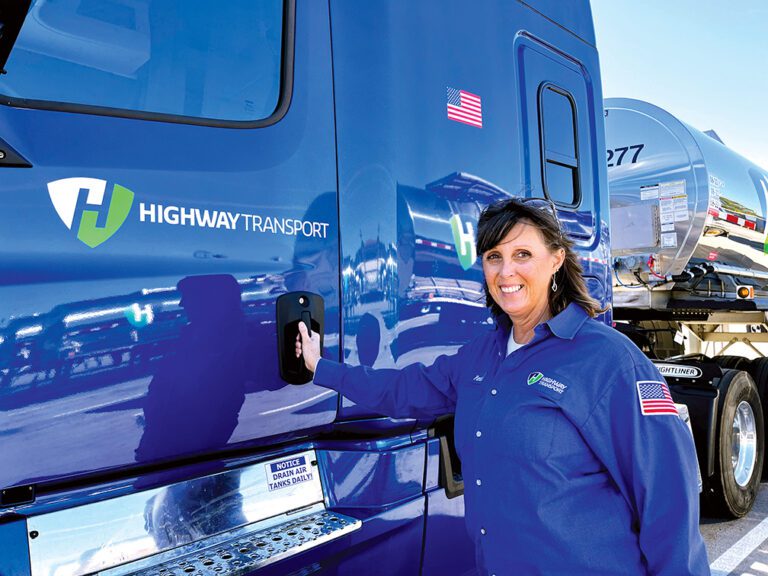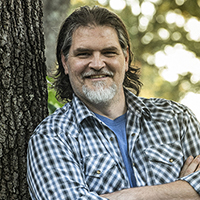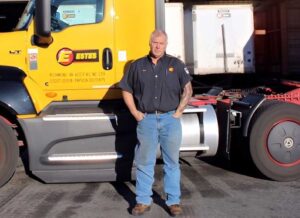Pam Randol knew exactly where she wanted her life to lead at a very early age.
“I was 8 years old when I saw a convoy of trucks on Interstate 40 in Oklahoma. I was sitting in the back seat of the car,” she said. “I decided right then I wanted to drive a truck in the Army.”
Randol, who is now a professional tank hauler for Knoxville, Tennessee-based Highway Transport, got her wish. As a young adult, she enlisted in the Army and stubbornly held out for an assignment as a truck driver for Uncle Sam.
“You remember the old computer-generated paper that had the dots and the little holes in the edge, and it had that pixelated printing?” she said. “When I went to enlist, I had a list probably 10 feet long of jobs that I could have chosen from, from spy, interrogator, linguist, helicopter mechanic. (It was) just a huge range because I scored high in communications, technical and mechanical.
“I said, ‘I want to drive a truck,’ and they looked at me like I’d lost my mind. They said, ‘Well, we really need…’” she continued. “I’m like, ‘I don’t care what you need. I want to drive a truck.’ I didn’t get to drive the truck that I wanted to — but I did get to drive a truck. I got to play in the dirt.”
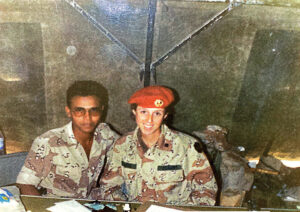
Randol says a great by-product of her military service are the mentors she got to learn under and the fellow women she drove alongside.
“I was fortunate enough to go through basic training and advanced individual training, and then on to permanent duty station, with several other women,” she said. “It was nice, because we were all new to the same area at the same time and all going through the same experiences. Our chain of command — our squad leaders, our platoon leaders, our patrons, our peers — they all were there to be helpful and guide you as well.”
That experience gave Randol the first taste of what she was capable of, and it prepared her for a long and rewarding civilian career behind the wheel. She notes that the job was very different “back in the day.” Like many drivers from the era, Randol shakes her head at the creature comforts of today compared to yesteryear.
“When I started, we didn’t have cellphones and GPS and those types of things,” she said. “You had to get a map, and learn how to read a map and manage your fuel. You had a book for fuel, you had a map, you had to stop and call a customer to get an address and directions, all those kinds of things.
“Then, you either had a calling card or a 1-800 number, and you would stand in line waiting your turn to get to the phone so you could make your call,” she added. “That might be outside in the wind or the rain, or it might be inside at the truck stop when they had the phones at the tables.”
Randol would eventually be introduced to tankers, starting with a stint as a tack truck driver for a road construction company. The experience was brief, but it stuck — and as she racked up experience hauling hazardous materials, the idea of transporting it by the tankload became more and more appealing.
“I had to have my tanker endorsement with my job before this company. I drove a dry van, but I hauled the big bulk containers of chemicals,” she said. “Those totes were anywhere from 2,500 to 5,000 pounds, depending on what size tote you had and the weight of the liquid. I could feel those loads whenever I hauled them, and I thought, ‘Driving a tanker probably wouldn’t be that bad. If I can do this, then surely I can drive a tanker.’”
At the request of her family, Randol temporarily left the road and went to work in the medical field. But after a decade, she was itching to get back behind the wheel. She made a beeline for the tanker industry. Once more, she’d have to dig in her heels and bide her time to get an opportunity.
“I went to one of those Great American Truck Shows, and I remember talking to a tanker company,” she said. “In the early 2000s the companies could be more selective of drivers, because it wasn’t a drivers’ market at the time. They said, ‘Go get two years of experience and call us later.’
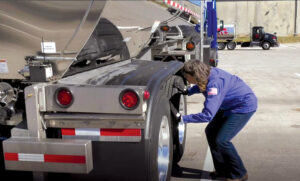
“My opportunity finally came a few years ago, when the guy I’m married to now came to work at Highway Transport and I followed him over,” she continued. “I just can’t see myself ever working for another company or ever driving any other type of trailer. I wish I’d have started here when I was young and spry.”
Over the past nearly four years of driving a tanker full time, Randol has hauled latex and poly products ranging from paint to cosmetics, vitamins, insecticide and foam seat products — just to name a few. She delivers for a dedicated account that takes her cross-country and back from California and Oregon, passing through the Great Lakes and mid-America down to the Carolinas.
In total, she’s covered about 2.5 million miles, touching 47 of the lower 48 states, missing only North Dakota during her 25-year driving career. She says driving a tanker, a job she still holds in common with her husband, Joe McMullin, is the pinnacle of her driving career.
“I like the challenge of this (cargo) being volatile, and ‘this is what you have to do’ to make sure you get it to where you’re going safely,” she said. “For me, this is easier to learn than putting my head down in a book. Yeah, obviously you’ve got to read instructions to operate and everything, but I like the challenge.
“And then, they’re just so happy to see you when you get there,” she said with a smile. “Even if you’re late, a lot of them are like, ‘We’re just glad you’re here.’”
In February, Randol was informed that, because of her consistent dedication, attention to detail and safety, she was a finalist in the National Tank Truck Carriers’ (NTTC) Driver of the Year competition. It’s an award for which she is humbled just to be considered.
“I can’t lie and say that I’m not thrilled and flattered, because there’s a lot of times (I’ve thought), ‘Nobody notices me. Nobody knows what I go through. Nobody appreciates what I do,’” she said.
“For this award to come up, I’m honored, I’m excited. If I win, I hope I can live up to the expectations and put forth the message that NTTC would want,” she concluded. “I would represent them honestly and professionally. For me, tankers are the way to go.”
Dwain Hebda is a freelance journalist, author, editor and storyteller in Little Rock, Arkansas. In addition to The Trucker, his work appears in more than 35 publications across multiple states each year. Hebda’s writing has been awarded by the Society of Professional Journalists and a Finalist in Best Of Arkansas rankings by AY Magazine. He is president of Ya!Mule Wordsmiths, which provides editorial services to publications and companies.

